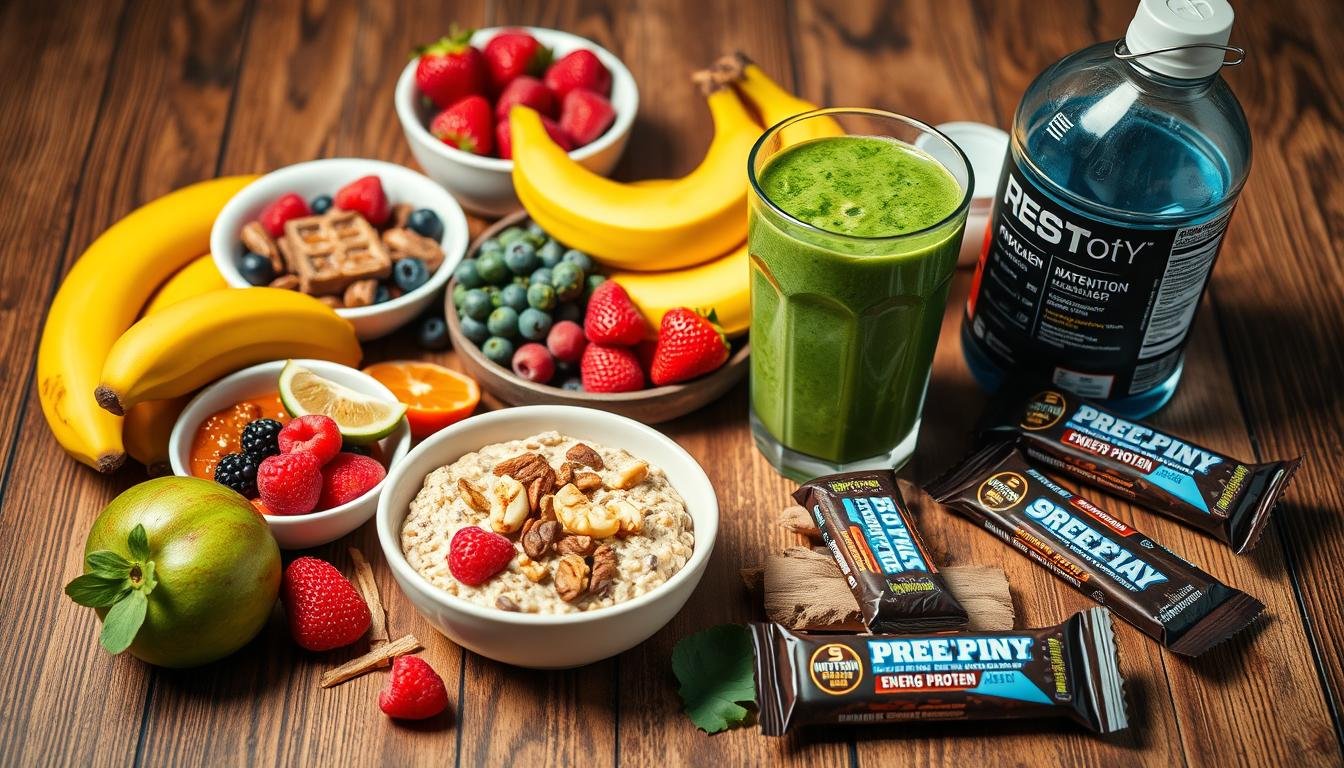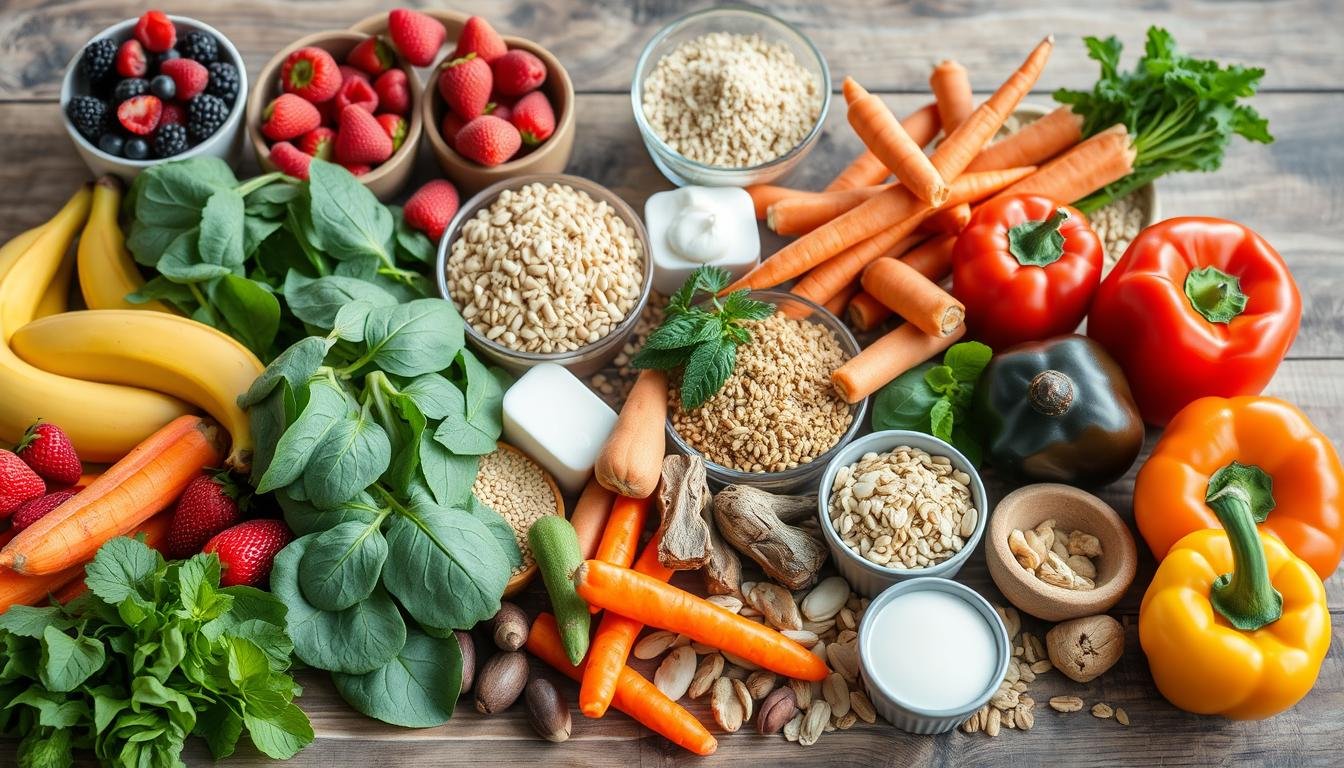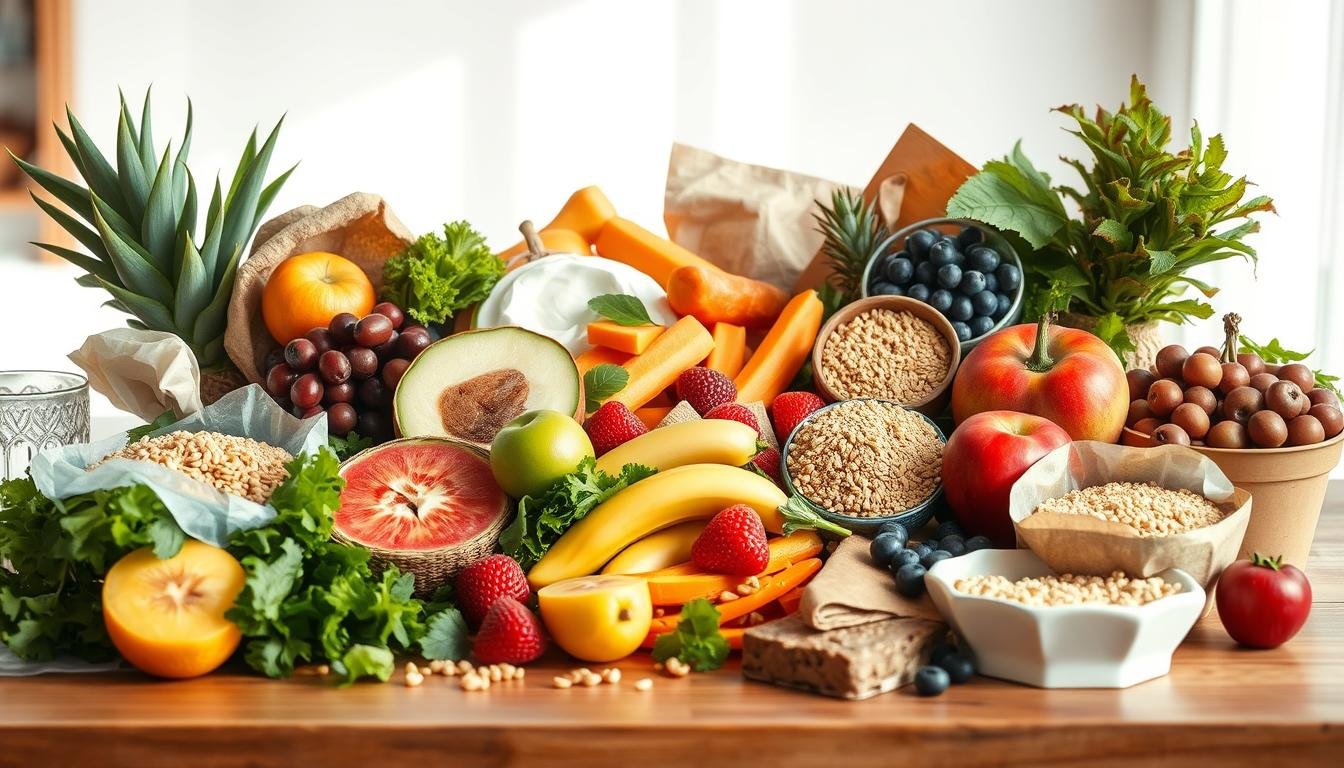Eating the right foods is key to getting the most out of your workouts. Before you exercise, eat foods that are easy to digest. Choose carbohydrates like fruits and grains. Avoid heavy, fatty, or protein-rich foods to prevent stomach problems.
After your workout, it’s time to refuel. Mix carbohydrates and protein to help your body recover. This combo helps restore energy and repair muscles. Don’t forget to drink plenty of water to stay hydrated and perform well.
Fueling Up for Optimal Performance
Proper pre-workout nutrition is key to getting your body ready for top performance. Understanding the role of carbohydrates is crucial. They are the main energy source for your muscles.
The Importance of Pre-Workout Nutrition
Eating a 200-250 calorie snack with carbs and protein 30-60 minutes before working out is beneficial. It helps keep your blood sugar steady and your energy up. This can greatly improve your endurance and intensity.
Carbohydrates: The Primary Energy Source
Carbs are the main fuel for your muscles during exercise. For workouts over an hour, aim for 30-60 grams of carbs per hour. This keeps your energy levels up. High-intensity workouts or training in hot weather might also need mid-workout fueling, studies show.
By choosing the right pre-workout nutrition, you can reach your full potential. This is true whether you’re playing sports, working out, or just staying active.
Nutrient Timing for Exercise
When you eat before working out is key for the best results. Try to eat your meal 1-3 hours before exercising. This lets your body digest it well.
If you’re short on time, a quick snack like a banana can give you energy fast. It won’t make you feel heavy.
When to Eat Before a Workout
Eating a meal 1-1.5 hours before working out is best. This lets your body use the nutrients for energy. Include 20-40 grams of protein from lean sources like chicken or Greek yogurt.
Portion Control and Snack Options
It’s important to control how much you eat before working out. Too much can make you feel slow, too little might not give you enough energy. Opt for small snacks like a banana with nut butter or a handful of nuts if you’re in a rush.
| Pre-Workout Snack | Grams of Carbs | Grams of Protein |
|---|---|---|
| Banana with 2 tbsp nut butter | 30g | 8g |
| Granola bar | 20-30g | 5-10g |
| Greek yogurt with berries | 15g | 15g |
Energizing Snacks and Meals
Choosing the right pre-workout snacks and meals is key to powering through your exercise. Go for energy-boosting foods that mix carbs, protein, and healthy fats. This mix fuels your muscles and keeps you energized.
Quick and Easy Pre-Workout Snacks
Great pre-workout snack choices include whole-grain cereals with low-fat milk, yogurt with fruit, or peanut butter and banana on whole-wheat toast. Also, try a smoothie with protein-rich yogurt and your favorite nutrient-dense options. These snacks are easy to make and digest, giving you the energy you need before the gym.
Adding pre-workout snacks to your routine helps keep your energy up and boosts your workout benefits. By eating the right mix of nutrients, you’re on your way to reaching your fitness goals.
What to Eat Before and After a Workout
Proper pre-workout nutrition and post-workout recovery are key to getting the most from your workouts. Before exercising, eat carbs that are easy to digest. This gives your muscles the energy they need. After, eat carbs and protein to refill glycogen stores and help muscles repair and grow.
Drinking water is also vital to stay hydrated and perform well during exercise. Research backs this up, showing that eating small amounts of peanuts can help with weight management. Smoothies with protein-rich yogurt and fruit boost energy and keep you hydrated.
Studies also found that athletes who drank chocolate milk after working out recovered faster than those who drank carb-only sports drinks. Greek yogurt, with 20 grams of protein, is a great snack to add fruit for extra carbs. Salmon, rich in protein and omega-3s, can reduce muscle soreness after a workout.
For workouts over 60 minutes, refuel with 30-60 grams of carbs every hour after the first hour. Staying hydrated is crucial, so drink water throughout your workout. Aim to drink 16 ounces of water for every pound lost after exercising.
Eating protein and carbs within 30-60 minutes after a workout helps your body repair and build muscles. Foods high in antioxidants, like colorful fruits and vegetables, help repair muscles and boost your immune system.
Replenishing and Rebuilding
After a tough workout, your body needs to refill its nutrients. Eating a meal or snack with protein and carbs within 30-60 minutes is key. This helps restore muscle glycogen and aids in muscle repair and growth.
Post-Workout Protein and Carbohydrates
Try to eat 0.45 to 0.7 grams of carbs per pound of body weight right after exercise. For a 165-pound athlete, that’s about 75 grams of carbs. Also, include 0.1 to 0.15 grams of protein per pound of body weight. This means a 165-pound athlete should have around 20 grams of protein.
Hydration Strategies for Recovery
Drinking enough water is also vital for recovery. The American College of Sports Medicine suggests drinking two to four milliliters of water per pound of body weight before exercise. During exercise, aim to drink 0.3 to 2.4 liters of fluids per hour. For every pound of water lost, drink 20 to 24 ounces to rehydrate well.
Getting the right nutrients and fluids after a workout supports muscle repair and glycogen replenishment. By following these tips, you can enhance your recovery and get ready for your next workout.
Balanced Post-Workout Meals
Choosing a well-balanced meal after a workout is key. It should have protein-rich foods like lean chicken, salmon, or eggs. Also, include complex carbohydrates such as whole-grain bread, quinoa, or sweet potatoes. These foods help refill glycogen stores and support muscle recovery and growth.
Recent studies suggest endurance athletes should eat before intense workouts. This ensures they have enough energy. Before workouts lasting over an hour, eat easy-to-digest carbohydrates to keep energy levels up.
For post-workout nutrition, focus on protein and carbohydrates. Choose a snack with a 3:1 ratio of carbs to proteins if your workout was an hour or longer. Good protein sources include milk, eggs, soy, wheat, and peas, which help with muscle repair.
Salmon is great for post-workout recovery because it’s high in protein and omega-3s. Avoid too much fat and calories in your meals to stay on track with your workout goals and avoid weight gain.
| Nutrient | Importance |
|---|---|
| Protein | Aids in muscle recovery and growth |
| Carbohydrates | Replenish glycogen stores and provide sustained energy |
| Healthy Fats | Supports overall health and recovery |
Maximizing Nutrient Intake
Carbohydrates and protein are important, but other nutrients are key too. Electrolytes like sodium, potassium, and magnesium are lost in sweat. They can be replaced with sports drinks or foods like bananas, spinach, and avocados. This helps keep your body hydrated and muscles working right during and after exercise.
Healthy fats in nuts, seeds, and fatty fish give sustained energy and lower inflammation. These fats are vital for energy production. They also boost exercise performance by supporting cells and hormone production.
To get the most from your workouts, balance is important. Eating a variety of nutrient-rich foods and drinks helps your body. It gives you the fuel, recovery, and adaptation needed for physical activity.
Conclusion
Proper nutrition is key for fueling workouts, supporting muscle recovery, and improving overall health. Eating the right mix of nutrition for exercise before and after workouts is crucial. This includes carbs, protein, and other important nutrients.
By doing this, you can boost your workout performance, aid in recovery, and help build muscle. It also supports your overall health goals.
It’s important to listen to your body and try different foods before and after working out. This way, you can find what works best for you. Whether you’re into endurance sports, bodybuilding, or just want to look and feel great, the right nutrition can help.
Nutrient timing is more important for athletes and serious exercisers. But, it can vary based on your goals and situation. The key is to find a strategy that works for you and helps you reach your overall health goals.





